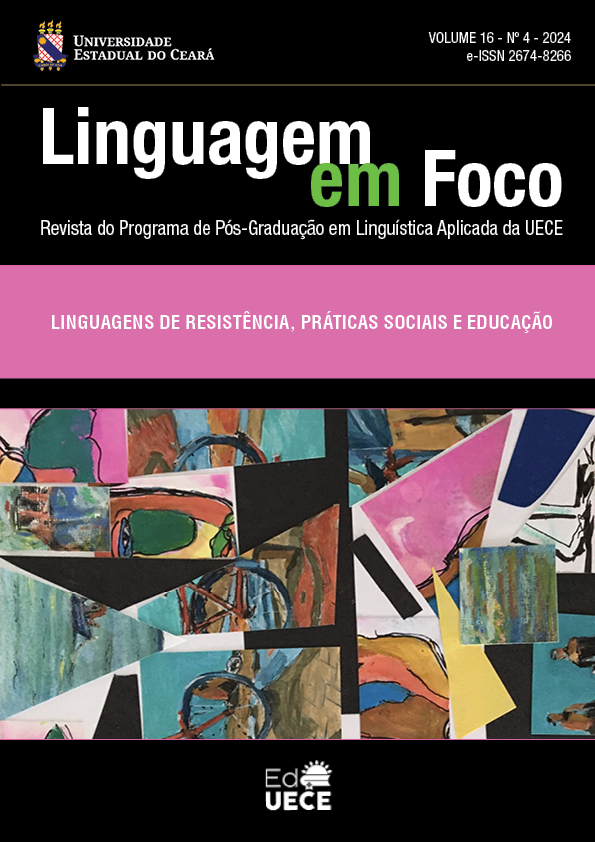Academic writing practices and resistance literacy
DOI:
https://doi.org/10.46230/lef.v16i4.15206Keywords:
academic practices, belonging, literacy, social practicesAbstract
In this essay, I propose a discussion of some connections that can be established between academic literacy and resistance literacy to address writing practices and approaches to the initial education of teachers as researchers and outreach agents in a language teaching course. To achieve this aim, I analyze some experience reports describing activities proposed by two professors who taught the academic literacy subject in 2024, along with two students’ contributions to the reflections by means of autobiographic essays they produced as an end-of-course evaluation task. I resume some previous works (Correa, 2009, 2011, 2014, 2017, 2021) and keep the theoretical background based on language as social action and practice. The conclusion of the discussion shows that the set of academic practices can result in a kind of reconstruction, a continuum nurtured by affections that guide, or should guide our choices, the construction of our academic identity and, consequently, the use of academic genres in our reflections upon our social identities. Thus, resistance literacy is built up through belonging, which in turn, is built when we manage to align dreams and projects. Therefore, academic literacy, in its early stages, might be one of the ways of joining resistance literacy and life projects.
Downloads
References
BASTOS, L. F. A escrita e a vivência. 2024. Manuscrito.
BRITTO, L. P. L. Educação linguística escolar: para além das obviedades. In: CORREA, D. A.; SALEH, P. B. O. (Org.). Estudos da linguagem e currículo de Letras: diálogos (im)possíveis. Ponta Grossa: EDUEPG, 2008.
CORREA, D. A. Aspects of writing and identity. Language Sciences, Oxford, v. 33, p. 667-671, 2011.
CORREA, D. A. Práticas linguísticas e ensino de língua: variáveis políticas. In: CORREA, D. A. (Org.). Política linguística e ensino de língua. Campinas: Pontes, 2014. p. 21-37.
CORREA, D. A. Política linguística e ensino de língua. Calidoscópio, São Leopoldo, v. 07, p. 69-75, 2009.
CORREA, D. A.; PRADO, S. A. C. Language policy and language teaching: conditions of adaptability. In: SILVA, D.; MEY, J. (Org.). The Pragmatics of Adaptability. 1. ed. Amsterdam & Philadelphia: John Benjamins Publishing Company, 2021. p. 325-342.
CORREA, D. A. Sobre o protagonismo na linguagem escrita e novos modos de interação. Revista Brasileira de Linguística Aplicada, v. 17, p. 641-661, 2017
CORREA, D. A. Vulnerabilidade social, desafios epistêmicos e conhecimentos rivais: por diálogos mais horizontais. Trab. Ling. Aplic., Campinas, v. 58, n.1, p. 1-18, jan./abr. 2019.
GORCZEVSKI, D.. Apresentação. Um convite aos afetos. In: GORCZEVSKI, D.. (Org.). Arte que inventa afetos. Fortaleza: Imprensa universitária, 2015
HARRIS, R. Rethinking writing. London: Continuum, 2000.
LEITE, E. G.; PEREIRA, R. C. M. Práticas de letramento acadêmico na construção do pertencimento de alunos de iniciação científica a comunidades de prática: uma análise a partir de relatórios de pesquisa. DELTA, São Paulo, 37-3, 2021.
PINTO, J. P. Hegemonias, contradições e desafios em discursos sobre língua no Brasil. In: CORREA, D. A. (Org.). Política linguística e ensino de língua. Campinas: Pontes, 2014. p. 59-72.
PINTO, J. P. Modernidade e diferença colonial nos discursos hegemônicos sobre língua no Brasil. Muitas Vozes, Ponta Grossa, v. 1, p. 171-180, 2012.
PINTO, J. P.; VALLADA, A D. Alguma coisa está fora da nova ordem interacional? Interação e mobilidade textual em infraestruturas digitais. Linguagem em (Dis)curso, Tubarão, v. 25, p. 1-21, 2024.
RAJAGOPALAN, K. A pesquisa política e socialmente compromissada em pragmática. In: SILVA, D. N.; FERREIRA, D. M. M.; ALENCAR, C. N. (Org.). Nova pragmática: modos de fazer. São Paulo: Cortez, 2014. p. 101-128.
RAJAGOPALAN, K. O fomento do pensamento crítico para a formação de cidadãos responsáveis: um desafio e tanto. Prefácio. In: COSTA, R. D. C.; SANTOS, E. C.; SILVA, K. A. (Org.). Educação intercultural, letramentos de resistência e formação docente. 1. ed. Campinas: Editora da ABRALIN, 2021.
SCUDLAREK, |A. T. Apresentação. 2024, Manuscrito.
ZAVALA, V. Quem está dizendo isso?: Letramento acadêmico, identidade e poder no ensino superior. Tradução de Luanda Sito e Marília Curado Valsechi. In: VOVIO, C.; SITO, L.; DE GRANDE, P. (Org.). Letramentos: rupturas, deslocamentos e repercussões de pesquisas em linguística aplicada. Campinas-SP: Mercado de Letras, 2010.
Downloads
Published
How to Cite
Issue
Section
License
Copyright (c) 2025 Djane Antonucci Correa

This work is licensed under a Creative Commons Attribution 4.0 International License.
Authors who publish in Linguagem em Foco Scientific Journal agree to the following terms:
- Authors retain the copyright and grant the journal the right of first publication. The articles are simultaneously licensed under the Creative Commons Attribution License which allows sharing the work with an acknowledgement of its authorship and initial publication in this journal.
- The concepts issued in signed articles are the absolute and exclusive responsibility of their authors. Therefore, we request a Statement of Copyright, which must be submitted with the manuscript as a Supplementary Document.
- Authors are authorized to make the version of the text published in Linguagem em Foco Scientific Journal available in institutional repositories or other academic work distribution platforms (ex. ResearchGate, Academia.edu).





























